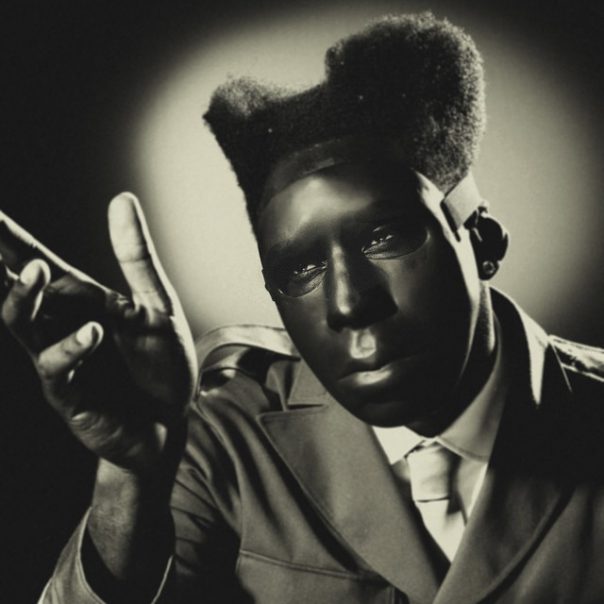ALBUM REVIEW: Tyler, The Creator takes his mask off on ‘CHROMAKOPIA’

Tyler, the Creator, “CHROMAKOPIA.”
Despite being one of the most prolific faces in hip-hop, Tyler, the Creator has always been intentionally opaque with his personal life, letting his artistic endeavors speak for themselves. On his new album, CHROMAKOPIA, he slowly begins to take off his mask.
CHROMAKOPIA
Tyler, the Creator
Columbia, Oct. 28
8/10
Get the album on Amazon Music.
With his early work, Tyler left listeners on edge, and sometimes offended, with aggressive bars and a knack for shock value. In recent years, he’s shifted toward a sunnier sound, carving out a niche, synth-soaked production style and fewer out-of-pocket lyrics. This, along with some fascinating concepts and characters created for each of his LPs, has brought him wide acclaim and a new fanbase.
CHROMAKOPIA is another step forward in his artistic growth, adding new layers to his recognizable sound. It also finds him opening up about fears he’s never discussed before.
Throughout CHROMAKOPIA’s 14 tracks, he raps about what’s holding him back from freedom and happiness: monogamy, pressures to start a family, his heritage, fame and expectations of Black people—all on a journey to liberate himself.
The opener, “St. Chroma,” introduces the masked character on the album cover, an alter ego that paradoxically allows Tyler, the Creator to explore these personal themes. The song is cinematic and expansive, starting minimally with whispered rapping behind a beat composed of marching footsteps and eventually leading into a billowing chorus delivered by a choir. “Can you feel the light inside?/ Can you feel that fire?” sings the choir, encouraging Tyler to begin his journey of self-discovery and acceptance.
“Rah Tah Tah,” one of the album’s most traditional Tyler songs, offers irreverent humor and unabashed confidence front and center. As the song progresses, he gradually becomes less comfortable with his current position in life and his fear and paranoia begin to shine through, signaling the start of his period of growth.
Further down the tracklist, Tyler dives into personal pressures to commit to a single relationship, have a family and kids, and settle down. He doesn’t seem quite ready for that yet. On “Darling, I,” he shares his discomfort with having to commit to one person for his entire life, wanting to explore and experience romance with different people. On “Hey Jane,” he raps from the perspective of both members of a couple in wake of a surprise pregnancy. Both songs are impactful, with a clear vulnerability coming through on each along with satisfying beds of synths and snappy percussion.
“I Killed You” similarly explores societal pressures, but this time with a focus on living as a Black man. The “You” in the title refers to Tyler’s hair, as he sings about how he’s tried to destroy his natural Black hair to conform with Euro-centric standards.
Some songs take inspiration from the sounds of previous Tyler, the Creator albums. The soulful synth lines on ”Like Him” are strongly reminiscent of 2019’s IGOR and the falsetto intro of “Darling, I” comes from 2021’s Call Me If You Get Lost. Tyler explores completely new territory on other songs, including single “Noid” (short for “paranoid”) where he sings about the fears and dangers that come with fame over a thunderous rock instrumental. Musically and lyrically, the song’s unrestrained intensity—along with its addictive chorus sampled from a Ngozi Family song—makes it a highlight.
While his unique production style is still found on each song, he trades some of his sunny synths and pop melodies for darker sounds and straightforward rapping, sacrificing some of his catchy hooks on the way. Unlike many of his previous albums, some of these songs seem to get a bit more muddled together, even if they’re all interesting on their own.
The project also boasts some big features, including GloRilla, Sexyy Redd and Lil Wayne all on one song, “Sticky.” GloRilla gives the best verse on the chaotic track, sometimes fun and sometimes annoying, which sounds most like Tyler’s early work on controversial records like 2011’s Goblin.
The album’s thematic centerpiece, and perhaps its most effective track, is “Take Your Mask Off.” It skillfully tells the stories of three different characters: a gangster seeking validation, a closeted yet homophobic priest and a conflicted suburban housewife. “I hope you find yourself/ I hope you take your mask off,” he sings to them. But as the grooves slow down to a more bare production, Tyler turns the sentiment toward himself.
He expresses distress over his clothing brand not selling well, his music not being successful enough and not meeting others’ expectations. But he’s working toward being himself and removing those layers of anxiety. Tyler’s mom, who has spoken bits throughout the project, assures him to continue on this journey of self discovery on the final track. “You just never cease to amaze me,” she tells him. “There’s no words right now how I feel.” With each new project, and each step toward maturity and vulnerability, Tyler never ceases to amaze.
